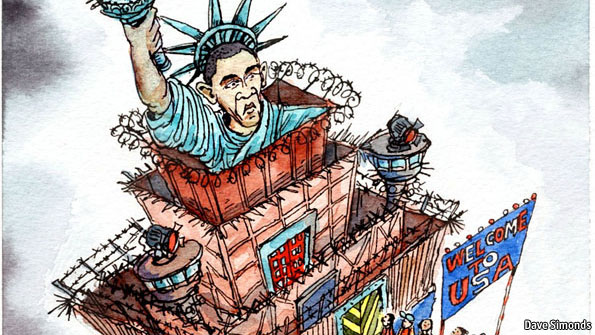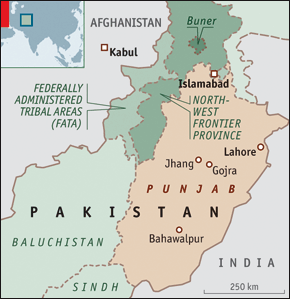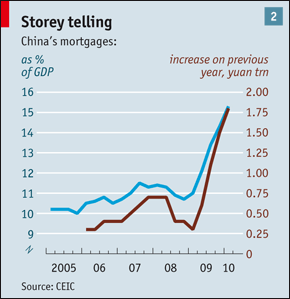 Two recent overseas pieces reference the blog and the vision. The first is an op-ed in the English-language version of the People's Daily Online, the Chinese Communist Party's mainline publication. The authors provide this dual biography:
Two recent overseas pieces reference the blog and the vision. The first is an op-ed in the English-language version of the People's Daily Online, the Chinese Communist Party's mainline publication. The authors provide this dual biography:
 John Milligan-Whyte is called the "new Edgar Snow" and the "21st century Kissinger" and is the only non-Chinese to be elected the winner of the Social Responsibility Award from the China Business Leaders Summit. John Milligan-Whyte and Dai Min are the executive producers and co-hosts of the Collaboration of Civilizations television series adapted by the eight books they wrote in the America-China Partnership Book Series published in English and Mandarin in 2009-2010 that created the "New School of America-China Relations." They founded the America-China Partnership Foundation and Forum in 2008 and the Center for America-China Partnershipin 2005, which was recognized in 2009 as "the first American think tank to combine and integrate American and Chinese perspectives providing a complete answer for America and China's success in the 21st century."
John Milligan-Whyte is called the "new Edgar Snow" and the "21st century Kissinger" and is the only non-Chinese to be elected the winner of the Social Responsibility Award from the China Business Leaders Summit. John Milligan-Whyte and Dai Min are the executive producers and co-hosts of the Collaboration of Civilizations television series adapted by the eight books they wrote in the America-China Partnership Book Series published in English and Mandarin in 2009-2010 that created the "New School of America-China Relations." They founded the America-China Partnership Foundation and Forum in 2008 and the Center for America-China Partnershipin 2005, which was recognized in 2009 as "the first American think tank to combine and integrate American and Chinese perspectives providing a complete answer for America and China's success in the 21st century."
I am rightfully accused of being a peace-monger on China in a column titled, "Thomas Barnett recommends US never go to war with China." Tripping through the piece:
Peaceful coexistence has today become both all that the US can afford militarily and economically and essential for US economic and national security. The Iran and North Korea crises are becoming impossible for the US to defuse without long over due new US policies towards China. The limitations of American military and economic power are unfortunately dangerously self-evident. The US military is already over extended and bogged down in two long wars. The US financial, economic, unemployment and government solvency crises are relentlessly entering even more dangerous stages. It is easy for the US to start or be forced into new wars that are impossible for anyone to win given the potential speed and economic impact of major wars. The world has changed. Conventional American policies and policymakers' mindsets must change faster than they can.
Fortunately, President Obama recognizes the need for and is now urgently searching for unconventional policies capable of bring the US back from the brink of economic collapse and unbearable humiliation or catastrophic wars with Iran and North Korea that can overnight engulf the Middle East, Asia and the world in economic, social and political collapse . . .
What is China to do? New American policies towards China are essential for the US and China to be able to solve the America's economic and the North Korea, Iran and other national security crises. Conventional American policies exacerbate rather than solve these crises for the reasons explained by the Center for America China Partnership's books and articles and now fortunately by Thomas P.M. Barnett.
On June 2, 2010 Thomas Barnett stated that China: "can now legitimately claim to be working on behalf of the global economic security as much or more than America. In short, it can claim that 'what is good for China is good for the world,' an argument to which only America could lay serious claim in past decades. This is why we're never going to war with China; codendency on globalization is profound."
US News & World Reports describes Thomas Barnett as "one of the leading strategic thinkers of our time." Barnett has seen and understood the world from his roles of senior advisor to the US Secretary of Defense, Chief of Staff, Central Command, Special Operations, and led the five-year NewRulesSet.Project for the U.S. military. He is the author of two books that have been profoundly influential: The Pentagon's New Map: War and Peace in the 21st Century and Blueprint for Action: A Future Worth Creating. Barnett's comments were posted on his website,http://www.thomaspmbarnett.com/globlogization/tag/china, in response to an article in the Financial Times on May 24, 2010, http://www.ft.com/cms/s/0/de337ab6-66ca-11df-aeb1-00144feab49a.html.
The Financial Times article titled "The way to increase America's exports to China" was published as the second round of the Strategic and Economic Dialogues began by Dr. Huo Jianguo, president of the Chinese Academy of International Trade and Economic Cooperation, a subsidiary of China's Ministry of Commerce, and John Milligan-Whyte, chairman of the Center for America China Partnership. Barnett quoted five paragraphs from the article stating that they are a "nice summary of China's thinking regarding our bilateral economic relationship" and "an excellent and hard-to-refute summary argument" . . .
Thomas Barnett has an extraordinarily American reputation and track record of successfully prompting American policymakers to realize that profound changes in US military strategic thinking are required. Today the US's conventional economic and national security policies have not provided either economic or national security although the US economy is by far the largest in the world and US military spending is over half of all nations . . .
Then we get some Paul Kennedy--not exactly my favorite take.
Then this interesting twist:
Chinese policymakers have understood for thirty years, as Thomas Barnett stated this week, that America and China must never go to war. President Obama implementing that advice requires healthy changes America's whole relationship with China. China's military spending is 12 percent of the US, although its population is 500 percent larger. China has been at peace with all nations since 1979 and had the fastest growing economy in the world because it's policymakers adopted Deng Xiaoping's policies of opening up to foreign investment and peaceful coexistence with America and all other nations. America must now reciprocate Deng Xiaoping's policies. President Obama must become America's Deng Xiaoping.
For 60 years there has been a fundamental core problem in US-China relations that only President Obama can and needs to change now: US policymakers and policies have not accepted the legitimacy of the Chinese government. Chinese policymakers were optimistic when President Obama was elected with the promise and mandate for change at a time of profound American economic and national security crises. It has been 60 years since the birth of modern China and resulting outbreak of the Korean War, which never formally ended as the sinking of a South Korean naval vessel reminded us. The views of Thomas Barnett quoted above support an unconventional perspective for American policymaking: that America should accept peaceful coexistence with the 22 percent of mankind and the legitimacy and success of their indigenous government. It has been very successful in managing sustained economic growth, social and political stability, peaceful foreign and defense policies, and reform and opening up to American investment . . .
The cool twist was the reverse imaging on Deng-Obama. The second para oversells the lack of legitimacy argument, but I suppose that's a backhanded reference on Taiwan, because that's where the text goes next.
A bit down the road:
American policymakers wonder what has changed, since they are merely continuing conventional US policies of selling arms to Taiwan irrespective of China's national security needs? Everything has changed. American policymakers do not understand sufficiently that the US's relationship with China has abruptly and prematurely forever entered a new 21st century era when the US Federal Reserve Chairman Bernanke and Treasury Secretary Paulson told the world that the US financial system and economy would collapse without immediate government bail out of insolvent American banks and insurance companies. Now America is itself, like many nations, insolvent. What has changed is what Paul Kennedy feared would happen in The Rise and Fall of Great Nations published in 1987. Hopefully, President Obama will agree with Thomas Barnett's recommendations . . .
A bit of Chinese hubris, I might argue.
Better bit, which I argue with wholly:
The third question is does President Obama believe that many existing American policies towards China undermine America's economic and national security? The White Paper cites as an example, that US policy is to prevent Chinese oil companies from buying American oil companies, prevent China from interfering with America's sources of oil and acquiring oil from nations America disapproves of such as Iran. This approach seeks to be win-win only for America and is not realistic. America and China, the two largest economies, consume more oil than they produce. Many US policymakers today believe that this makes war between the two nations inevitable.
It means exactly the opposite. The two nations that consume 42 percent of the world's oil must be both economic and military allies, aligning their economic and national security in a new era of peaceful coexistence, or neither will have the oil they require. It benefits no nation for oil to vary in price from 47 to 147 US dollars a barrel. Collaborating America and China could stabilize the price of oil at a price of 65 to 70 US dollars a barrel benefiting all nations and militarily and economically ensure the peace that is essential for steady oil production and transportation globally. The US and China entering a new era of really collaboration, because they both recognized they will never go to war, would change the Iran and other issues profoundly.
In a style typical for People's Daily, a certain listing of grievances packs the piece, which ends with a near-term reference to the slighting of Gates.
In summary, Chinese policymakers refusing the US Defense Secretary's request to visit China signals President Obama personally that conventional American policymaking will not be effective in the Iran and North Korea crises. It signals President Obama personally that Chinese policymakers need the US to accept the legitimacy and success and reciprocate the peaceful coexistence policies of China's indigenous government, and to reciprocate and open up to Chinese companies investing, and thus creating US and Chinese economic and employment growth. That breakthrough is what is essential to make the world governable.
Overall, pretty interesting to watch a fellow peace-monger work the argument from the other side, clearly operating within certain sensitivities (e.g., all pertinent grievances must be aired--very Chinese). To my knowledge, this guy is the only American I've ever heard of--maybe even the only foreigner--ever to have a foreign affairs column at the People's Daily, so he's certainly in a fascinating category--whatever it is. Upon sending him an email, he sent me back a long reply that catalogues all the content he's running through their system as a one-man content empire, so once I get his most recent tome, I'll either review it here or at WPR, because it's all certainly indicative of something worth commenting on.
Anyway, something to remember: Christianity is all about sin, so it's all about repentance equating to salvation. Confucianism deals with the problem of disorder, so the solution is all about harmony leading to social order. In other words, the old justice-versus-order conundrum. There is a middle ground upon which the two sides can meet, but we have to have to understand how differently the Chinese view the world and its dangers. We will accept a lot of disorder in the name of justice; they will not. Somewhere between lies globalization's path for a long time to come.

Second reference comes in Il Tempo.
Piece about PM Berlusconi and his foreign policy ambitions in Africa, with a special notion of taming Gaddafi.
My left-over Romanian is such that I can just about understand the reference to the libro PNM.
 Non a caso la Cina sta investendo miliardi di dollari in Africa e gli Stati Uniti hanno deciso di rilanciare la loro politica di cooperazione e sviluppo nell'area. Il continente dimenticato, in un mondo che si fa sempre più stretto e affollato, diventerà molto presto la scacchiera dove le grandi potenze si contenderanno il primato. In fondo la storia anche in questo caso ama ripetersi. Fu così anche nell'epoca coloniale, quando gli imperi decisero di allargare i loro confini. Fu una delle tappe della globalizzazione. Gli effetti sono quelli di una società connessa che ha le sue aree di crisi e di guerra dove è disconnessa. Quest'ultimo è un concetto sviluppato da un pensatore strategico di nome Thomas P.M. Barnett che in un libro intitolato «La nuova mappa del Pentagono» spiega come siano le società disconnesse (dalle relazioni internazionali, dall'economia, dalla rete) a creare focolai di crisi pericolosi per la stabilità mondiale. Pensateci bene, per lungo tempo anche la Libia è stato un Paese disconnesso, fuori dal network internazionale, isolato e, purtroppo, terrorista.
Non a caso la Cina sta investendo miliardi di dollari in Africa e gli Stati Uniti hanno deciso di rilanciare la loro politica di cooperazione e sviluppo nell'area. Il continente dimenticato, in un mondo che si fa sempre più stretto e affollato, diventerà molto presto la scacchiera dove le grandi potenze si contenderanno il primato. In fondo la storia anche in questo caso ama ripetersi. Fu così anche nell'epoca coloniale, quando gli imperi decisero di allargare i loro confini. Fu una delle tappe della globalizzazione. Gli effetti sono quelli di una società connessa che ha le sue aree di crisi e di guerra dove è disconnessa. Quest'ultimo è un concetto sviluppato da un pensatore strategico di nome Thomas P.M. Barnett che in un libro intitolato «La nuova mappa del Pentagono» spiega come siano le società disconnesse (dalle relazioni internazionali, dall'economia, dalla rete) a creare focolai di crisi pericolosi per la stabilità mondiale. Pensateci bene, per lungo tempo anche la Libia è stato un Paese disconnesso, fuori dal network internazionale, isolato e, purtroppo, terrorista.
The piece seems to argue that Berlusconi is pursuing a strategy of heightened connectivity with North Africa. How very Roman.
 Thursday, June 17, 2010 at 1:23AM
Thursday, June 17, 2010 at 1:23AM 


































